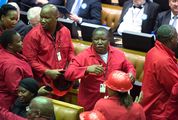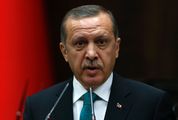David Brown is the CEO of Coal of Africa.
COAL of Africa CEO David Brown speaks to Business Day TV about half-year results, which show a widening loss due in part to foreign exchange losses
BUSINESS DAY TV: Coal of Africa’s (CoAL’s) first half to the end of December is more of a deal-making frenzy than anything else as it works to get in cash and financial backing in order to pursue its Makhado Project. The company is also facing off a challenge from Rio Tinto for payments allegedly owed by CoAL now which it disputes. David Brown is the CEO of CoAL and joins us in the News Leader studio.
David...before we get to the frenzy of activity that you’ve engaged in, which is all centred around Makhado, is the Rio challenge going to throw you off because it’s a contractual obligation which we understand you are supposed to pay $19m? You say by June 2017, they say now, so is this going to put a bit of a spoke in the wheel?
DAVID BROWN: From our point of view quite clearly, we are disputing that, their position. They’ve alleged a breach in terms of the contractual obligations and effectively on the basis of that breach, have demanded instant payment. We believe that there is no such breach to remedy and as such we believe the payments will fall due as and when they are in terms of the contractual obligations and all payments need to be repaid anyway by June 15 2017.
BDTV: What sort of a setback if you do have to go ahead and pay that now though?
DB: Quite clearly we have got cash in the balance sheet. Our results showed that we’ve got nearly $30m in cash on the balance sheet…we owe $19m. It’s not ideal to pay it all at once and certainly we would not want to be in that position, but quite clearly from our point of view we can afford it as and when it falls due.
BDTV: The scramble for cash seems to be maybe the theme in all mining companies’ lives at the moment but in yours it’s particularly acute as you work to try and get the Makhado Coal project up and running so tell us...maybe just sketch out for us what’s happened in the last six months, because there have been a variety of deals in order it seems to bulk up your cash holdings, in order to fund this project?
DB: Sure, in March last year we took a decision at our March board meeting that essentially we felt that it was important to get a cash generator into the group. Originally we thought that Vele could fit that bill. Obviously with the declining export prices we felt that it was not going to be financially viable to bring Vele into operation sooner rather than later and as such we still needed to get a cash generator into the group.
We felt that that was important from the point of view that the flagship project Makhado which we are developing is some three to four years away from cash generation. So we had a short-term gap that we felt that we needed to bridge.
BDTV: Which is Universal Coal? Is that what filled the gap?
DB: Absolutely yes.
BDTV: It seems to be quite a convenient deal because it does give you access to cash and it also gives you 20-year water usage licences so it fits quite nicely into what you are trying to achieve here?
DB: Yes...we had to take a decision given that export coal prices are looking rather subdued presently and the outlook probably for the next 24-36 months probably does not look a hell of a lot better from where we are now. So we felt that given Universal’s niche Eskom supply, it would provide us with an annuity income stream for the next three or four years while we wait for prices to improve.
BDTV: It’s not just Universal because…perhaps you need to talk us through the deal with Hengshun and the Chinese investment company. It almost seems to be a deal that puts you in the role of supplicant, so they take a 34% stake in Baobab which is the effective owner of the mining rights to Makhado in order that they get the contract for the engineering and I suppose the development of the Makhado mine, which is worth $400m, which is more than what the asset is worth at $335m. So is it a deal that you have to take in order to get more backing to advance this project?
DB: As I said, CoAL is a standalone company. Effectively had the Vele project and Makhado project and the greater Soutpansberg projects. The Vele project, as I said, was a brownfields operation that we were looking initially to bring on stream as soon as we could to provide the cash generation or near-term cash generation in the group. Makhado was always going to be the flagship greenfields project but it certainly always had a life of about four years to bring to fruition and therefore left that gap from now until four years when Makhado was in production. So hence bringing Universal or the acquisition, the proposed acquisition around Universal.
In terms of the Greater Soutpansberg, a very significant resource, but that would be longer-term. So that will be 10 years plus in terms of providing longevity for the company in terms of a production profile.
Essentially the Makhado project we’ve always been trying to push as quickly as possible from the point of view that we know it has a hard coking coal element, which effectively positions CoAL as a unique proposition within the junior coal space. There is currently no hard coking coal produced in SA. Given that there is a domestic need for that product we felt that it was an obvious one to start pushing on Makhado.
In addition Makhado was very well advanced when I got to the company and essentially it made sense given the investment already made, that we continued to push forward with that project. So the Hengshun is really just a natural evolution of trying to fund that particular project. Given that CoAL has a relatively small market capitalisation to raise that type of funding in the current commodity environment is quite tricky, so therefore essentially we wanted to put together a package deal.
And Hengshun, you’re saying right, we supply the EPC (engineering, procurement and construction) to them, they bring the equity investment but they also have to bring the debt funding as well whether it be themselves or effectively they facilitate that.
So if one was to look at a package of potential cash that they bring for the project, which is really over $300m and which is the lion share in terms of providing the funding for us to get the Makhado project going. So we felt that the award of the EPC contract in the context of that was actually not a bad deal for shareholders.
BDTV: You talked about coal prices being depressed probably for the next two-and-a-half, three years but by the time Makhado does come on stream would you have expected any recovery and which markets would you be aiming this at?
DB: Essentially we’ll be producing two products, we’ll be producing the hard coking coal, which we would earmark for domestic, Arcelor Metal being a primary target for us in terms of steel-making industry. There would potentially be some hard coking coal that would also be available for the export market and that could be into the Indian market or into the Chinese market and the thermal as they were essentially trying to develop a domestic supply.
Given your question around pricing we do see pricing improving over that three-to four-year period. Maybe not quite as robustly as we originally thought but certainly where it would be much higher than where we are now.
BDTV: David just a last question, what’s the next six months hold for CoAL; what’s your strategic impetus?
DB: The strategic impetus is really to close out on the Universal transaction, number one. Number two effectively continue to make progress in terms of the Makhado funding and if we get both of those right then CoAL is a transformed Company.





















Login OR Join up TO COMMENT